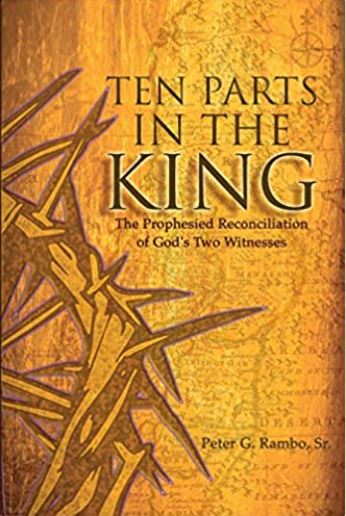Dear readers, here is a terrific article by good friend, Travis Hughey. he takes a subject that has baffled many and in a few short paragraphs boils it down to a solution that makes total sense. I was so excited when I got to the end of the article!! Read it and tell us what you think!
aka, “Division” in the Kitchen
By Travis W. Hughey ©2016
I’ve been meaning to write something for quite sometime on this topic as I have a bit different perspective than most on the whole “boiling a kid in it’s mothers milk” thing. As with all things Judaism, rabbi’s over the centuries have demonstrated a penchant for over complicating the plainly simple. I cannot make any assumption on the motive to do so, just an observation of the trend. Recently a friend of mine, Zach Bauer (New2Torah) mentioned doing some video’s on understanding Torah by it’s agrarian roots. I agree, it’s high time we step back and take a close look at the life of ancient Israel to understand fully the text from which the metaphors used by Rabbi Yeshua teach us so much.
So let’s take a look at this prohibition of boiling a kid in it’s mothers milk thing. First the three references in Torah concerning this supposed “practice”:
The first, the first-fruits of your ground you shall bring to the house of YEHOVAH your Elohim. You shall not boil a kid in its mother’s milk. Exo 23:19
You shall bring the first of the first-fruits of your ground to the house of YEHOVAH your Elohim. You shall not boil a kid in the milk of its mother. Exo 34:26
You shall not eat of anything that died of itself. You may give it to the alien who is within your gates, that he may eat it. Or you may sell it to a foreigner. For you are a holy people to YEHOVAH your Elohim. You shall not boil a kid in its mother’s milk. Tithing you shall tithe all the increase of your seed that the field yields year by year. And you shall eat before YEHOVAH your Elohim in the place which He shall choose to cause His name to dwell there (Jerusalem), the tithe of your grain, of your wine, and of your oil, and the first-lings of your herd and of your flock; that you may learn to fear YEHOVAH your Elohim all your days. Deu 14:21-23
According to rabbinic Judaism’s perspective:
Separation of Meat and Dairy
On three separate occasions, the Torah tells us not to “boil a kid in its mother’s milk.” (Ex. 23:19; Ex. 34:26; Deut. 14:21). The Oral Torah explains that this passage prohibits eating meat and dairy together. The rabbis extended this prohibition to include not eating milk and poultry together. In addition, the Talmud prohibits cooking meat and fish together or serving them on the same plates, because it is considered to be unhealthy. It is, however, permissible to eat fish and dairy together, and it is quite common (lox and cream cheese, for example). It is also permissible to eat dairy and eggs together.
This separation includes not only the foods themselves, but the utensils, pots and pans with which they are cooked, the plates and flatware from which they are eaten, the dishwashers or dishpans in which they are cleaned, the sponges with which they are cleaned and the towels with which they are dried. A kosher household will have at least two sets of pots, pans and dishes: one for meat and one for dairy. See Utensils below for more details.
One must wait a significant amount of time between eating meat and dairy. Opinions differ, and vary from three to six hours after meat. This is because fatty residues and meat particles tend to cling to the mouth. From dairy to meat, however, one need only rinse one’s mouth and eat a neutral solid like bread, unless the dairy product in question is also of a type that tends to stick in the mouth.
The Yiddish words fleishik (meat), milchik (dairy) and pareve (neutral) are commonly used to describe food or utensils that fall into one of those categories.
Note that even the smallest quantity of dairy (or meat) in something renders it entirely dairy (or meat) for purposes of kashrut. For example, most margarines are dairy for kosher purposes, because they contain a small quantity of whey or other dairy products to give it a buttery taste. Animal fat is considered meat for purposes of kashrut. You should read the ingredients very carefully, even if the product is kosher-certified. (from http://www.jewfaq.org/kashrut.htm)
First, let’s note the difference in context from the commandment given in Torah (by the mouth of Yehovah) and that of the sages. Notice any difference? In the three verses cited from Torah, all of them are in the context of bringing the first fruits tithe offering. The sages, however move this statute of bringing in the tithe to include practices in the home kitchen. Right off the bat the context has been corrupted. Not only that, they extend the prohibition to poultry (which is nowhere mentioned in the prohibition concerning kid and milk at all) which is odd since no chicken anywhere has ever been milked!
As a side note, the “separation of utensils” reminds me of another contrast to Torah as well.
Please compare (from the rabbinic oral tradition):
“This separation includes not only the foods themselves, but the utensils, pots and pans with which they are cooked, the plates and flatware from which they are eaten, the dishwashers or dishpans in which they are cleaned, the sponges with which they are cleaned and the towels with which they are dried. A kosher household will have at least two sets of pots, pans and dishes: one for meat and one for dairy. See Utensils below for more details.”
And from Yeshua (quoting Isaiah, quoting Yehovah):
And answering, He said to them, Well did Isaiah prophesy concerning you, hypocrites; as it has been written: “This people honors Me with the lips, but their heart is far away from Me; and in vain they worship Me, teaching as doctrines the commandments of men.” (Isa. 29:13) For forsaking the commandment of YEHOVAH, you hold the tradition of men: washing of utensils and cups, and many other such like things you do. And He said to them, Well do you to set aside the commandment of YEHOVAH so that you may establish your own tradition? Mark 7:6-9
It would seem Yeshua dealt with Kashrut and was clearly not a fan. In fact, He seemed to offend the masters of rabbinic halakhah on several occasions simply by walking in the commandments of His Father instead of the “tradition of the elders”. Strange. But I digress….
There’s another sticky wicket to this whole prohibition of meat and dairy eaten at the same time and that involves none other that the interaction of Abraham and Yehovah Himself:
And YEHOVAH visually appeared to him by the oaks of Mamre. And he was sitting at the door of the tent in the heat of the day. And he lifted up his eyes and looked; and, behold, three men were standing by him. And he saw, and he ran to meet them from the entrance of the tent. And he bowed to the ground. And he said, YEHOVAH, if now I have found favor in Your sight, I beg You, do not leave from near Your servant. Please allow a little water to be taken and You wash Your feet, and rest under the tree. And I will bring a bite of bread and will sustain Your heart. Then You may pass on, for this is why You have passed over to Your servant. And they said, Do so, as you have said. And Abraham ran into the tent to Sarah and said, Hurry, prepare three measures of fine meal, knead it and make cakes. And Abraham ran to the herd and brought a son of the herd, tender and good, and gave it to a youth. And he hurried to prepare it. And he took curds and milk and the son of the herd which he had prepared, and he set before them. And he stood by them under the tree. And they ate. Genesis 18:1-8
Apparently neither Abraham nor Yehovah got the memo concerning the need to keep these things separate.
When explaining away this situation, I’ve personally heard it said (paraphrasing) “we cannot give much weight to this situation since it fail;s the two witnesses (two mentioned in scripture) test”. So essentially, if it doesn’t fit into our version of halakkah, even if Elohim approves of it we cannot give it any weight because it basically disagree with rabbinic tradition. Sounds like this statement as well from Talmud:
“What did he mean by quoting this? Said Rabbi Jeremiah, ‘He meant that since the Torah has been given already on Mount Sinai, we do not pay attention to a heavenly voice, for You have written in Your Torah, ‘Decide according to the majority’ (Exodus 23:2). (from http://www.jewishvirtuallibrary.org/jsource/Judaism/Halakha_&_aggadata_&_midrash.html)
I’ve even heard it said that this prohibition is concerning some pagan practice of boiling a kid in it’s mothers milk. There’s two reasons why I have a problem with that hypothesis.
First the context of the commandment makes no reference to pagan practices as it outlines how to offer sacrifices before Yehovah. It’s not even assumed any dairy is brought for a tithe or offering. Notice what’s outlined as a tithe:
And all the tithe of the land, of the seed of the land, of the fruit of the tree, shall belong to YEHOVAH; it is holy to YEHOVAH. And if a man really redeems any of his tithes, he shall add its fifth to it. And all the tithe of the herd and of the flock, all that passes under the rod, a tenth shall be holy to YEHOVAH; he shall not search whether it is good or bad, nor shall he change it. And if he at all changes it, then it shall be that it and its substitute shall be holy; it shall not be redeemed. Leviticus 27:30-33
So, what constitutes a tithe?
-
“seed of the land”
-
“the fruit of the tree”
-
“ th herd and of the flock”
(As a side note, apparently, when you exchange money for the fruit of the land you are to add 20%. And, if you manipulate the choosing of the herd, both your choice and the one it was supposed to be are offered.)
Notice what’s missing? Milk!! No milk is to be brought as an offering for the tithe. So why is it mentioned? How in the world could milk be brought to a sacrifice in which it’s not even outlined as part of it? Why would some Hebrew family bring milk to a sacrifice in which no milk is specified as they worship Yehovah according to His instructions which include not learning the ways of the nations?
Maybe about as ridiculous as the thought that a chicken should not be cooked in it’s mothers milk.
Second is, there is no credible record of a pagan ritual at that time being performed involving the practice of boiling a kid in it’s mothers milk.
Maybe we need to take another look at the commandment and the words used in the translation All three use this same phrase:
“You shall not boil a kid in its mother’s milk.”
Is it possible that what the translators are giving to us is biased by their tradition? A closer look at the words translated as “kid”, “mothers” and “milk” may give us a clue to what’s going on here. First, the word translated “kid” is the Hebrew word:
H1423 גּדי
gedı̂y ghed-ee’
From the same as H1415; a young goat (from browsing): – kid.
Next, the word “mothers”:
H517 אם
‘êm ame
A primitive word; a mother (as the bond of the family); in a wide sense (both literally and figuratively); (like H1): – dam, mother, X parting.
And finally “milk”:
H2461 חלב
châlâb khaw-lawb’
From the same as H2459; milk (as the richness of kine): – + cheese, milk, sucking,
All three passages use the exact same sequence of Hebrew words in a row. The phrase “in its” is not in the original text. Could it be possible that the long held tradition of the sages is driving the text in a wrong direction? The irony is, every person who has raised goats, calves and sheep know where I’m going with this. So let’s string the words together without the added phrase to “help the reader”:
“You shall not boil a kid mother’s milk.”
It still doesn’t make sense as milk is not mentioned as part of the sacrifice. But, if you replace the word milk with another of the words it translates to it begins to make perfect sense:
“You shall not boil a kid mother’s sucking.”
Granted this is a literal translation but could the passage possibly mean:
“you shall not offer a kid that’s still sucking it’s mother”?
This makes total sense. The only way milk would be involved in the sacrifice is if a nursing kid were offered and the milk being “in” the kid. This also makes sense taking into consideration, with this understanding, Abraham didn’t violate Torah (as was his reputation of keeping it (Gen. 26:5)) and according to Torah, animal offerings are to be at least a year old. In fact, this stipulation is mentioned at least 48 times concerning offerings made to Yehovah.
In case you want to verify, here are the references:
Exo 29:38,
Lev. 9:3, 12:6, 14:10, 23:12, 18, 19
Numbers 7:15, 17, 21, 23, 27, 29, 33, 35, 39, 41, 45, 47, 51, 53, 57, 59, 63, 65, 69, 71, 75, 77, 81, 83, 88
Numbers 28:9, 11, 19, 27; 29:2, 8, 13, 17, 20, 23, 26, 29, 32, 36
Ezekiel 46:13
Micah 6:6
Why would this be important? As anyone with a herd knows, taking a kid off it’s mother is potentially harmful to the mother and is basically cruel to both the kid and the mother.
What a beautiful picture of love and compassion for creation from our Creator!! Unfortunately missed by those focused on tradition far removed from the context of the commandment.





















































































































Much food for thought . . .
LikeLiked by 1 person
What you have shared makes so much sense, finally! Thank you!
LikeLike
Makes perfect sense!!
LikeLiked by 1 person
I think you have possibly “cracked the code” on this one brother! :0) As usual, many times in the scriptures, the answer is simple. If we were people who still worked the farm and took care of goats, we would more easily know what this verse meant, but we are so far removed from these things…… Like the others, this makes more sense than anything else I have heard of. YES!, “what a beautiful picture of love and compassion for creation from our Creator!!”
Shalom! Tommy
LikeLiked by 1 person
It is interesting how many of the agrarian metaphors come to life as you actually do them. Here’s just one jewel I’ve picked up on over the years:
I keep grapes for winemaking. Guess how long it takes for a rooted cutting to bear fruit? Three years!! Any fruit formed (it will try, it’s the “nature” of the vine) is removed so the vine can put it’s strength in developing a strong vine and deep root system to be able to bring a good harvest. Every year it is pruned back to get rid of unfruitful and unnecessary parts of the plant. The pruning process is also changed a bit from year to year as the vine develops on it’s trellis. Only on a mature vine are cuttings taken to plant new vines and when they are cut, they’re said to “bleed”, and they do. Pruning is also done at the end of winter (tribulation) when the vine appears to be dead just before the buds begin to swell and show signs of life so the cut area has plenty of time to heal through the next “cycle”. The best wines are made from plants that have experienced drought and hardship. All of this is about correct timing between the actions of the “husbandman” and the vines response to both the actions of the husbandman and the, shall we say, “appointed times”. Another confirmation that Yeshua, (after sprouting from the stump) will see a harvest after a time period with the number three attached. It’s also at this time he’s seen with the “juice” of men on His robe. By the way, Viticulture (and keeping animals and such) is referred to as “husbandry”. I could go on and on but maybe another time 🙂 .
Shalom.
LikeLiked by 1 person
Thank you, Travis, for the article and wonderful insights!
LikeLike
This was a terrific article. Thanks for the clarification on this topic!
LikeLiked by 1 person
Above, someone said “If we were people who still worked the farm and took care of goats, we would more easily know what this verse meant, but we are so far removed from these things” I have to point out here that the Rabbis were the few people who tended to know scripture. They went to school to learn. However, they were from and returned to agricultural communities. The families they left behind had flocks and farms. It is how they supported themselves, and their student while they were away learning. The idea that these rabbis were too far removed from the agricultural context is, I think, a false statement.
I am not stating that the conclusion the poster gives is wrong, or even right. Just that the assumption that the Rabbis were removed from context, is false.
In Jewish tradition, however, a text *can* be translated, it *may* be translated. The closer to the surface the meaning is, the more applicable for the masses. But semantic gymnastics allows for text to reach everyone in every situation.
LikeLike
Milk a chicken lol-ok, saving that to use 😆
LikeLiked by 1 person
What comes to mind during reading.
This is just how I see it… it doesn’t mean I’m right… checkout the scriptures in context for yourself.
The “milk” is the word of God…
1Ho, every one that thirsteth, come ye to the waters, and he that hath no money; come ye, buy, and eat; yea, come, buy wine and milk without money and without price. 2 Wherefore do ye spend money for that which is not bread? and your labour for that which satisfieth not? hearken diligently unto me, and eat ye that which is good, and let your soul delight itself in fatness.3 Incline your ear, and come unto me: hear, and your soul shall live; and I will make an everlasting covenant with you, even the sure mercies of David. Isaiah 55:1-3
If a man has believed and bought… buy, and eat; yea, come, buy wine and milk without money and without price… he becomes a Child of God… he partakes of the New Covenant made with the House of Israel and the House of Judah (Romans 11).
1 Wherefore laying aside all malice, and all guile, and hypocrisies, and envies, and all evil speakings, 2 As newborn babes, desire the sincere milk of the word, that ye may grow thereby:3 If so be ye have tasted that the Lord is gracious. 1 Peter 2:1-3
God does act like a mother—He grows up the Child of God so they’ll be able to eat meat… so… until he does… don’t condemn the new believer… the babe… in Jesus Christ—don’t boil the kid in its milk.
37 O Jerusalem, Jerusalem, thou that killest the prophets, and stonest them which are sent unto thee, how often would I have gathered thy children together, even as a hen gathereth her chickens under her wings, and ye would not! 38 Behold, your house is left unto you desolate. Matthew 23:37-38
12 For when for the time ye ought to be teachers, ye have need that one teach you again which be the first principles of the oracles of God; and are become such as have need of milk, and not of strong meat. 13 For every one that useth milk is unskilful in the word of righteousness: for he is a babe. Hebrews 5:12-14
Christ is the first born… the first fruit… the forerunner that blazes the trail before us…
29 For whom he did foreknow, he also did predestinate to be conformed to the image of his Son, that he might be the firstborn among many brethren. Romans 8:29
16 For if the firstfruit be holy, the lump is also holy: and if the root be holy, so are the branches. Romans 11:16
God protected the “first born” of Israel when He brought them out of Egypt… and He protected His only begotten “first born” Son who leads us out of Egypt (the world) to the Promised Land… the New Jerusalem.
So…
It could also mean… Jesus Christ came as a human “babe” to become the High Priest over the House of God… so don’t boil (kill) with the “milk of the word” the revelation of this Babe (Kid)—the Son of God who grew into our Redeemer and Savior. In other words… don’t use God’s own Word against Him.
To discredit the words of Christ… is to discredit the Torah.
46 For had ye believed Moses, ye would have believed me; for he wrote of me.47 But if ye believe not his writings, how shall ye believe my words? John 5
LikeLike
Wow! That’s GOOD! Some thoughts to chew on…. Thank you for sharing.
LikeLike
While discussing this article with Akpene Torku, she commented, ‘Of course! Don’t we see the same thing with Hannah and Samuel?”
Indeed, we do! 1 Samuel 1:22-24!!
LikeLiked by 1 person
YES!! Now we’re talkin’!!
LikeLike